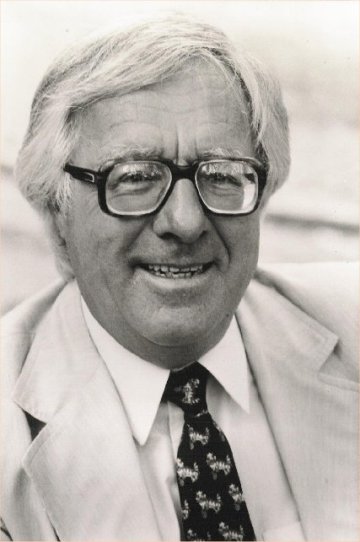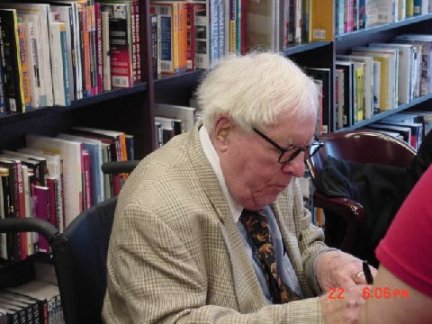

|

His first paid publication came in 1941, and in 1947 his first book was published, the short story collection Dark Carnival (Arkham House: Sauk City WI, 1947; the print run was limited to a little over 3000 copies). Also in 1947, Bradbury married Marguerite McClure, and began a marriage that was to last 53 years. The next few years saw several more books published: The Martian Chronicles and The Golden Apples of the Sun both in 1950, The Illustrated Man in 1951, and Fahrenheit 451 in 1953. Given Bradbury's love of Hollywood and the cinema, it was perhaps inevitable that he became a screenwriter. Chief among his credits is the screenplay for John Huston's 1956 production of Moby Dick, starring Gregory Peck. Recent years have seen the publication of From the Dust Returned (1999), Let's All Kill Constance (2002), One More for the Road (2002), The Cat's Pajamas (2004), The Homecoming (2006) and Farewell Summer (2006). At the time of this writing, Bradbury has published 13 novels, 56 collections (including poetry), 10 non-fiction books, and close to 600 short stories. "At the time of this writing" is an important qualification because, at 85, Bradbury still writes every day, and more books are on the horizon. For example, Match to Flame: The Fictional Paths of Fahrenheit 451 (Donn Albright, Editor) is scheduled for publication this Fall. This collection brings together the various short stories and novellas, some previously unpublished, that Bradbury later re-worked into the novel Fahrenheit 451. As reported in Wikipedia, Ray Bradbury has received a star on the Hollywood Walk of Fame, and in 2004, he received the (US) National Medal of Arts. He has been similarly honored with the World Fantasy Award for lifetime achievement, the Stoker Award for lifetime achievement, and the First Fandom Award, along with being granted SFWA Grand Master status and inducted into the SF Hall of Fame. Also, he received an Emmy Award for his work on The Halloween Tree, an asteroid is named in his honor - (9766) Bradbury - and a moon crater bears the name "Dandelion Crater" (after his novel, Dandelion Wine). Ray Bradbury is nothing less than a national treasure and is deservedly "celebrating a lifetime of wonder and imagination" (tagline from the website, www.raybradbury.com). BookThink: In Death Is A Lonely Business, your writer/sleuth alter ego gives advice to another writer: "Tomorrow morning you get out of bed, walk to the machine, no phone calls, no newspaper reading, don't even go to the bathroom, sit down, type, and Elmo Crumley is immortal." Is immortality the goal or just a byproduct? Bradbury: It's a byproduct. You can't predict these things. If people like you, that's fine. If they don't like you, then to hell with them. I've never thought about those things; you just get your work done. I've had a great life, I've been writing since I was twelve years old - every single day of my life because I love writing. I love books and I love libraries. I've had a perfect life, and the fact that some people love my books is the dividend. BookThink: Perhaps the most quoted pieces of advice you give to aspiring writers is don't try to imitate writers you admire. Bradbury: You can imitate when you are young. I did that when I was twelve years old. It's natural. I imitated Conan Doyle, and I loved Jeeves and the Wizard of Oz ... I loved a lot of writers like that. But by the time you are twenty years old, you give up imitating and you become yourself. BookThink: Is that because from the age of twelve to twenty, you are in fact learning who you are? Bradbury: Well, you're falling in love with so many people. I loved HG Wells because he was paranoid, and when you are sixteen years old, boys are all paranoid. They discover that the world means them, and death means them, and they get aggravated at the ways of the world. So they read The Invisible Man and The Man Who Could Work Miracles [SF EDITOR'S NOTE: a book and later a film by H.G. Wells in which the Gods decide to give a mortal man nearly unlimited powers - a conceptual forerunner to the Jim Carey film, Bruce Almighty]. HG Wells speaks to their paranoia, so it's quite natural that I fell in love with Wells in high school. BookThink: Do you still write every day ... Bradbury: Yes, every day. BookThink: ... and how do you avoid imitating Ray Bradbury? No, I don't think about that. Whatever is new in my life ... if I want to write a poem, I write a poem. If I want to write an essay, I write an essay. If I come up with a short story idea, then it's a short story. I don't compare myself with me. I look at the very instant of living - I don't look behind and I don't look forward. I live inside the instant. BookThink: As a young writer learning the craft, what authors most influenced you? Bradbury: Oh, Edgar Rice Burroughs. When I was twelve years old, I read all of the Martian books, and I wanted to go to Mars. I went out on the lawn on a summer evening and said "Mars, take me home." BookThink: Didn't we all. Bradbury: In a way, Edgar Rice Burroughs took me to Mars, and I never came back. BookThink: In previous interviews, you've cited the influence of John Collier. Bradbury: Very much so, though I didn't discover him until I was about twenty-two years old. BookThink: You and Collier were in Hollywood at about the same time, were you not? Bradbury: I came to Hollywood when I was thirteen years old [1933]. My father came to Los Angeles looking for work. So I was lucky I arrived here just one year after I started writing, and I was around Hollywood people. I was around the studios, and I was in love with motion pictures. I lived near a theatre where I could bump into Laurel and Hardy in person, or Norma Shearer or any of the big stars from MGM. So, I was in love not only with libraries, but also with motion pictures. I was lucky to be living in Hollywood then. [SF EDITOR'S NOTE: John Collier, International Fantasy Award winner. Bradbury wrote an introduction for the restored edition of Collier's Fancies and Goodnights. Collier was a master of the short story and is sometimes compared to Saki for odd ending twists that make a story stick in your mind. Like Bradbury, Collier's works were multi-genre, with contributions in fantasy, mystery and horror - often all three at the same time. Also like Bradbury, Collier wrote Hollywood screenplays, including contributing to The African Queen in 1951, along with James Agee and John Huston. Bradbury worked with Huston on the latter's 1956 production of , starring Gregory Peck as Ahab. Collier was 20 years Bradbury's senior.] BookThink: 1950's Hollywood has been the setting of some of your stories [SF EDITOR'S NOTE: See, for example, "Death Is A Lonely Business"], and your imagined Mars was perhaps the best-realized character of The Martian Chronicles. How important is a sense of place in your writing? Bradbury: No, I don't worry about that ... it takes care of itself. If you're writing about Mars, you write about the locale. You set the scene - the atmosphere, the weather - and if you do a good job then people believe it. Or if I'm writing about Waukegan, which is Greentown. It's the setting of my latest novel, Farewell Summer [SF EDITOR'S NOTE: scheduled for publication in October, 2006] - and it's all about the Ravine that cut across the town. When I was a kid, we were in and out of the Ravine because it was magical and mysterious, and evocative. So, the Ravine is set as the scene again and again, in Dandelion Wine and in Something Wicked This Way Comes, and in my new novel. BookThink: That's interesting because Stephen King uses exactly the same metaphor in many of his stories set in Derry, Maine. He talks about an area called the Barrens, which cuts through the town - an element of wildness in the middle of civilization. It's specifically a place where children go, to get away from their parents, to get away from the rules ... Bradbury: Yes, exactly. BookThink: This past Memorial Day weekend, I sold books in the Dealers Room at the Balticon SF convention here in Baltimore. I was pleased to see that copies of many of your older titles such as Dandelion Wine and The October Country sold quite well. Would you agree with the perception that many publishers have let their backlists of classic titles slide? Bradbury: Well, it depends on the author. If you have authors you believe in, you keep them in print. I was lucky that I had Walter Bradbury at Doubleday, and he pretty much kept me there. My new publishers, Avon and William Morrow, have Jennifer Brehl, who is a wonderful editor. She has all my books in print right now, at least twenty of them. That's incredible, I'm very lucky. It depends on the individual editor to have enough brains to realize there's a market for certain writers. Right now I'm old enough, I've been around enough years, that my editors say "Well, let's keep the old man around a little bit longer." BookThink: And of course many of your books have been on the approved reading lists for school curriculums across the country - for decades now. Bradbury: Well, I've been very lucky, yes. BookThink: There is a joke that circulates in the bookselling community, something to the effect of charging a premium for the "rare, unsigned Bradbury." Bradbury: Absolutely, if you can find a book of mine not signed, buy it no matter what the price is. Those are very rare.

BookThink: What was your motivation for signing so many of your books over the years? Bradbury: Well, people asked me - that's my motivation. Someone comes up to me with one of my books, and says "Sign it." It's just that simple. BookThink: Do you have a favorite story or memory from any of the book signings or SF conventions you've attended? Bradbury: Nooo ... I lecture at libraries all the time, I've lectured at every single library in Southern California - over 100. What is gratifying is that people who show up, hundreds of them - they range in age from ten years old to eighty. So you see, I not only belong to children, which is great, but to older people too. I feel very fortunate to look out at the audience and to see a lot of very young kids out there. Last week a seven year old wrote to me and told me he loved me. BookThink: The Harry Potter books have gotten a lot of praise for re-introducing reading to children, but I think your books deserve just as much credit. Bradbury: Well, I hope so.
>>>>>Click here for page two>>>>
Questions or comments?
| Forum
| Store
| Publications
| BookLinks
| BookSearch
| BookTopics
| Archives
| Advertise
| AboutUs
| ContactUs
| Search Site
| Site Map
| Google Site Map
Store - Specials
| BookHunt
| BookShelf
| Gold Edition & BookThink's Quarterly Market Report
| DomainsForSale
| BookThinker newsletter - free
Copyright 2003-2011 by BookThink LLC
|

|
|